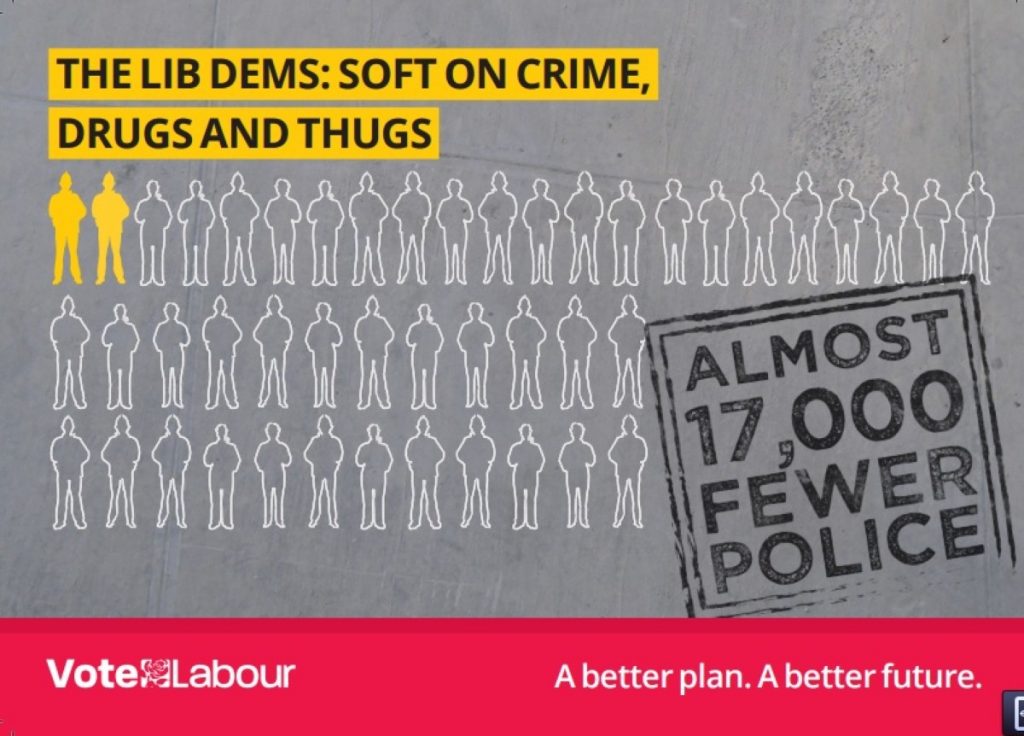Labour attacks Lib Dems for being ‘soft on drugs’
There's nothing more conservative than a Labour candidate fighting someone to their left. There is a kind of frenzied joy – a release – whenever Labour gets to take on a Green or a Liberal Democrat. They use the full Conservative arsenal: financial responsibility, stands-to-reason pub chat and standard-issue law and order rhetoric.
The Lib Dem's involvement in the coalition means Labour is unable to attack the party from the right on economic matters, but their support for drug law reform still gives them room on law and order.
One leaflet now available from Labour's party campaign shop warns voters that the Lib Dems are "soft on crime, drugs and thugs".
It goes on:


"They would end prison sentences for drug possession – even for the hardest drugs like heroin and crack."


Overall, this is comparatively moderate. The Lib Dem's decision to call for an end of prison sentences for possession and pursue a harm minimisation strategy on drugs has resulted in remarkably little kick-back. With much of the tabloid press onside, or rather no-longer off-side, only the Daily Mail has really gone for them. And the Labour and Tory response has been notable for its absence. Once upon a time both parties would have jumped on the party as lunatic drug promoters. Now, with a sense the tide has turned against the war on drugs, they keep mostly silent.
But the leaflets shows how hard it is to beat old habits. Labour is up to the same old tricks on drug policy, even though its defence of prison sentences betrays the principles it supposedly holds. Drug possession laws are the vehicle through which tens of thousands of young people have their lives ruined, with the worst consequences falling predictably on black and Asian kids.
There are two big problems with drug possession offences. First, they are considered a 'recorded crime outcome', meaning that finding a small bit of cannabis on a teenager is statistically equivalent to solving a murder after a months-long investigation. This has the effect of encouraging police to search kids – especially ethnic minority kids – wherever possible. It gets their numbers up.
The second problem is that they are so easy to prosecute. All you need is the arresting policeman in court confirming they found the substance on the defendant and forensics to show that it is indeed the substance in question. It's hard for a jury to do anything but convict.
These twin incentives make drug possession laws particularly attractive to the Police and the Crown Prosecution Service (CPS).

The results are devastating. While just seven out of 1,000 white people are searched for drugs, the number doubles for mixed race people and shoots up to 18 per 1,000 for Asians. It more than doubles again to 45 per 1,000 for black people. Black people are arrested for cannabis possession at five times the rate of white people in London. They are issued cannabis warnings at three times the rate.
Every year, between ten per cent and 15% of all indictable offences brought before the courts are for drug possession. The people who get prosecuted are young – often very young. One in ten of them are between the ages of 15 and 18. And again, they're disproportionately black. Black people are sentenced at a rate of 4.5 times that of white people for drug offences. They are subject to immediate custody at five times the rate.
No party which believed in social justice or racial equality could tolerate this system. It disproportionately targets disadvantaged kids and worsens the manner in which they are disadvantaged.
Ed Miliband has seemed almost apologetic when refusing to sign up to a more liberal position on drugs so far this election. That was certainly the image he gave off during a debate with young people on BBC 3. Home affairs spokesperson Diana Johnson spent so much time saying nothing during a recent Commons debate on drug laws that many observers presumed Labour's position was now an absence. It didn’t have the bravery to support calls for reform, but didn't seem willing to go on the attack either.
These leaflets suggest the old gremlins are still there, however. Labour is up to its same old tricks.









